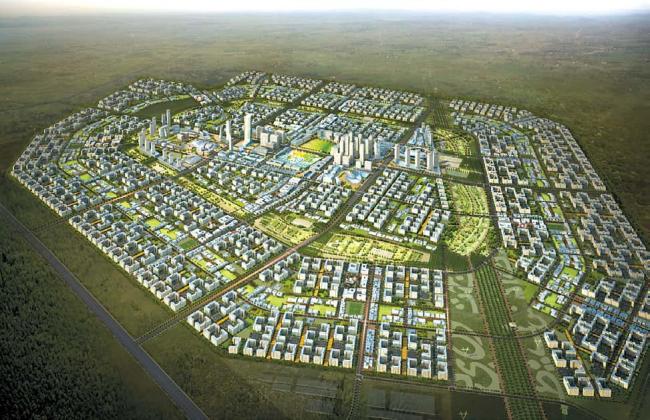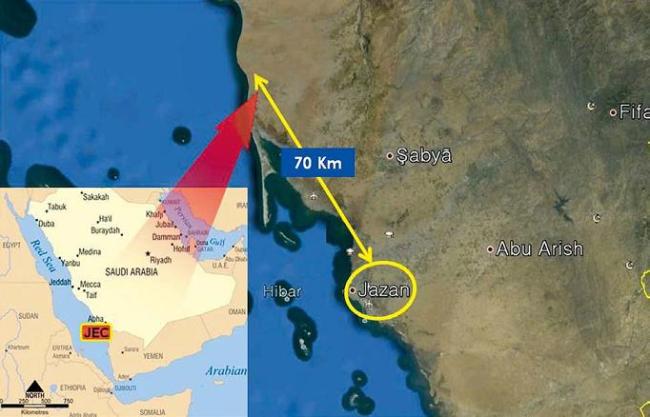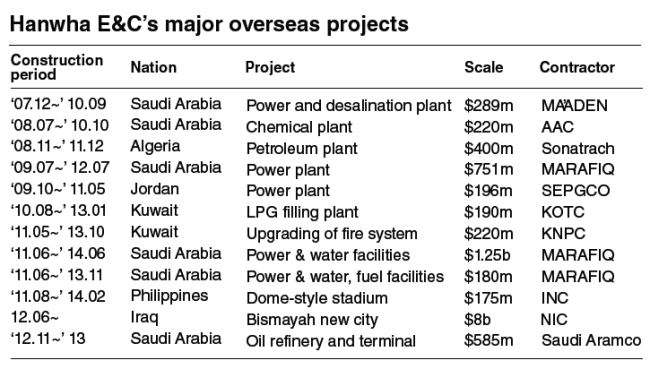 |
An artist’s rendering of a new city development project of Bismayah in Iraq (Hanwha E&C) |
Hanwha Engineering and Construction may be a latecomer in overseas construction markets. But it is Korea’s fastest growing builder, and has seen its accumulated orders exceed those of its Korean rivals this year.
Hanwha E&C, a construction unit of Hanwha Group, said Wednesday that it has signed a $585 million deal to build an oil refinery and terminal in Saudi Arabia.
Under the deal with Saudi Aramco, the world’s biggest oil producer, Hanwha will build the terminal that can process 400,000 barrels of oil per day by 2016 in the kingdom’s southwestern economic city of Jazan near the Red Sea.
With the latest order, the total value of orders Hanwha has won this year totals $8.33 billion won ― the largest among Korean builders for the year.
Behind the company’s successful advance into overseas markets and its achievements, there is Hanwha Group chairman Kim Seung-youn, officials said.
“The latest achievement was based on chairman Kim’s global management strategy and support,” said Hanwha E&C vice chairman and CEO Kim Hyun-chung.
“He appointed an executive officer who is responsible exclusively for overseas projects and also created a task force consisting of 100 company officials to win the Iraqi project,“ CEO Kim said.
The terminal construction includes complicated procedures such as building mooring facilities and an 8.8-kilometer underwater pipe to ensure an oil supply from a supertanker.
 |
The map of the construction site of Hanwha’s oil refinery and terminal project in Saudi Arabia (Hanwha E&C) |

Based on its expertise and business competitiveness, Hanwha outperformed international builders during a bidding race in September, the company said.
In the meantime, Hanwha is also seeking to cement business cooperation with Iraq, hoping to lead the “second Middle East boom” as the Mideast country rebuilds after the war.
In May, Hanwha signed a $7.75 billion contract to build 100,000 homes in Bismayah, a satellite city of Baghdad, for completion in 2019.
The building project, which includes the establishment of water supply and sewage systems, is the nation’s second-largest overseas deal next to its $20 billion nuclear plant contract with the United Arab Emirates in 2009.
It is the first instance of exporting the nation’s new-town-building expertise.
Hanwha officials expect it will take about seven years to complete the construction.
In September, Hanwha chairman Kim and Iraqi Prime Minister Nouri al-Maliki met in Baghdad to discuss the construction project and other issues of mutual concern such as the Korean company’s business opportunities amid Iraq’s ongoing postwar reconstruction.
“I want to contribute to developing the future relationship between Korea and Iraq and to have more opportunities to participate in the growth of Iraq,” Kim was quoted as saying by company officials.
“We need more specific discussions on the modernization of military facilities. And about the installation of solar panels at schools, we will carry out pilot programs promptly if you pick some model schools,” he said at the time.
According to Hanwha officials, the prime minister responded positively to Kim’s proposal, saying, “(I would) consider Hanwha not as a Korean company but as an Iraqi company and hope to continue our partnership.”
Since winning the Bismayah project, Hanwha has sought to join Iraq’s rebuilding efforts, including individual solar power facilities at every school in Iraq as well as in the new satellite city.
Hanwha last year unveiled a long-term vision: to join the world’s top 100 builders by 2015 by diversifying its business portfolio.
The company also aims to earn more than 20 percent of its profits from overseas markets and expand the portion to 40 percent over the next three years.
By Lee Ji-yoon (
jylee@heraldcorp.com)






![[Herald Interview] 'Trump will use tariffs as first line of defense for American manufacturing'](http://res.heraldm.com/phpwas/restmb_idxmake.php?idx=644&simg=/content/image/2024/11/26/20241126050017_0.jpg)



